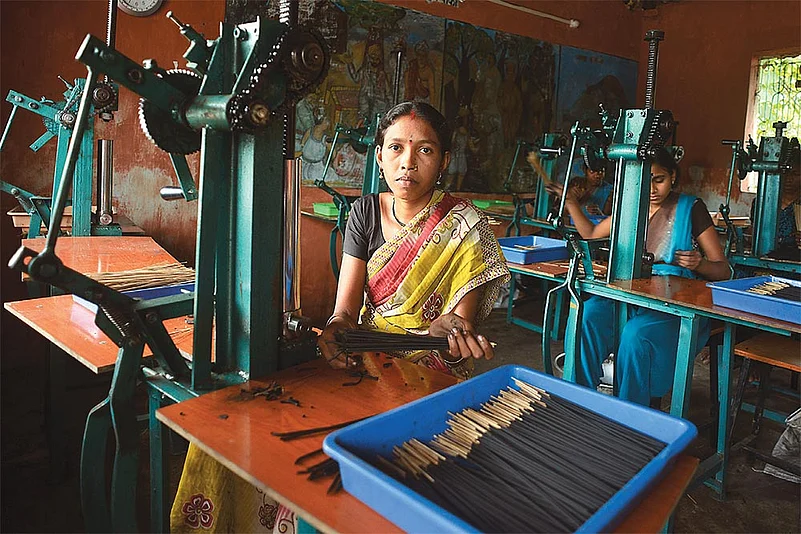Thickly forested Gadchiroli district in Maharashtra’s least developed Vidarbha region is among the poorest districts in the state and has an abysmally low 0.21 ranking on the Human Development Index. To add to misery, the area is a Naxal stronghold. It’s in areas such as these that Mumbai-based social enterprise, The Village Store (TVS), hopes to make a difference. Its mission is to create employment opportunities, especially for women, in the hinterlands. In Gadchiroli, with the help of district forest authorities and village communities TVS has managed to set up agarbatti (incense sticks) making units in Gadchiroli’s five divisions.
Each centre currently works with 10 machines and employs 10-15 women. For each kilo of agarbatti, the women get ₹10. Most women are able to make around 10-15 kg a day working for about eight hours, 5-6 days a week — thus making₹2,500-3,000 a month. The raw agarbattis are sold to the likes of ITC, Mangaldeep Agarbatti and other sellers who further value-add and sell them under different brands. “All households put this money in their savings bank account to ensure their daily food requirements, a difficult task for many,” says Manutram Kaluram Gedan, head of the local panchayat, who helped start the centre in his own village. Deepali, a woman worker, says that she has managed to make ₹2,400 in a month, something that she never thought she could ever in her life.
Giving back
The brain behind TVS is 38-year-old Vinay Kumar. A former banker, Kumar quit his job with ICICI Bank in December 2006 to join the UN-backed NGO Pratham to understand the ropes of the NGO sector. After two years, he quit Pratham in 2009 to start TVS with his own savings of close to ₹5 lakh and around₹50,000 from social enterprise support group, Unlimited India. Currently, TVS’ business model consists of two main streams of operation. One is its initial business stream — TVS began by selling products made by rural India-based NGOs and organisations as corporate gifts and exports to other countries.
But what has become a larger part of its operations is its work as a consulting firm and agency that helps create and execute employment generating projects. It is hired by companies and government agencies alike to do so.
For instance, TVS set up its first agarbatti making project in Nagaur, Rajasthan for Indiabulls Foundation and ITC. In Gadchiroli, it has signed an MoU each with local authorities of the five Gadchiroli divisions to set up similar units. For its services, TVS now charges a flat fee of ₹50,000 a month from its clients (previously ₹40,000). For FY12, TVS clocked a turnover of ₹16 lakh with profits of ₹6 lakh.
The change in the business model came about with a chance meeting with ITC officials in 2010. ITC ran similar agarbatti making projects in Munger, Bihar and Odisha with groups such as SEWA. As per Indian law, manufacture of agarbattis is restricted to small enterprises. Kumar saw the potential for generating rural employment and set about finding ways of executing the projects in the Indian context. Soon enough ITC put Kumar in touch with raw material producers, importers of agarbatti making machines and other such trade partners. By January 2011, Indiabulls Foundation too had come on board. The foundation had already identified Nagaur district for its social welfare activities and wanted TVS to set up agarbatti units there.
Fire in the belly
Kumar toured the Nagaur area extensively for nearly five to six months to find the right villages with the required infrastructure and people who would be willing to stick their necks out on an untried and untested business.
With knowledge and buyback guarantees from ITC and money for machines and raw material from Indiabulls, Kumar started a 20-machine centre in Nagaur in May 2011. But the centre was forced to shut down just after two months. “Local caste politics between Jats, Rajputs and the SC, STs led to violence and attacks on the centre,” says Kumar.
He did not give up though. He managed to convince another local in Nagaur to make the required investments for about five machines in November 2011. And thus the first successful project came about.
The machines were leased to him with the help of Indiabulls and the lease was also to be paid back from the profits generated from making agarbattis. TVS even supplied the Nagaur local-turned-entreprenuer raw material and bought back the finished products to convince him of the project’s viability and sold the products to the likes of ITC. “With overheads such as rent and electricity and people costs, it costs about ₹60-63 a kg to manufacture agarbattis and the finished products are sold to companies at ₹70-75 a kg,” informs Kumar.
Over time, as the scheme worked, others too came forward. Now, there are some 140 such machines working at Nagaur — another 30 are expected to be added by September. The lease scheme has been withdrawn and people have to purchase the machine. “We have also offered to put the people directly in touch with the raw material supplier and buyers,” informs Kumar. Nagaur, previously known for caste-based issues, vandalism and hooliganism, is now gaining a reputation for being a leading agarbatti making hub.
Once Kumar figured the way of making these centres successful, he implemented similar projects in Gadchiroli as well. He is now working on increasing the services they can perform at these centres. For instance, at Gadchiroli, they want to introduce perfuming and packaging of raw sticks. “We will then be able to charge ₹110-150 per kg,” says Kumar.
Ground Reality
With agarbatti making a success, TVS is working on creating other avenues for employment such as rural BPOs. In Surat, it is looking at working with a local entrepreneur who has a licence for running a non-voice based BPO from TataSky. Kumar says he is still trying to figure out the scope of work that can be done here as the rural youth could be trained to make data entries. Kumar feels that through these projects TVS will be able to create more rural employment and empower women.
In doing so, The Village Store may help sort issues threatening to rip India from within. “It is tough to work in rural areas in the country where you have issues like caste politics and Naxalism. But these problems will diminish if we can ensure economic growth,” says Kumar. The Indian government and corporate India could well pay heed to Kumar’s observation.






















